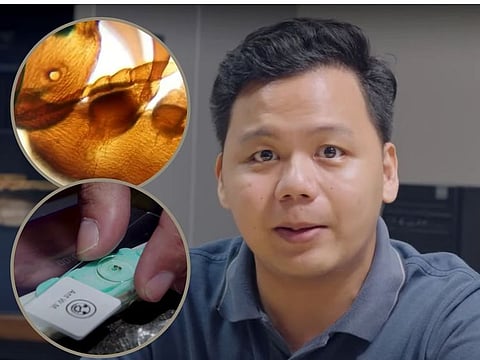Young Filipino inventor bags award for 'keychain microscope'
Dyson Foundation honours simple, revolutionary lab gear

Manila: In a remarkable achievement, a young Filipino inventor has been honoured with the James Dyson Award for his innovative "Make-roscope" project.
Jeremy de Leon, the brains behind this project, developed a single-lens "keychain microscope", literally a microscope in a keychain-like device, designed to be attached to any smartphone or tablet, enabling the magnification of microscopic samples on a slide from 125 to 400 times, the award body reported.
Groundbreaking invention
This groundbreaking invention, conceived during the height of the pandemic, outshone nearly 50 competing entries from across the Philippines.
As part of the award, de Leon will receive a cash prize of Php330,000 (about $6,000) to further advance his project. Additionally, he will have the opportunity to compete on the international stage of the James Dyson Award, with the potential to win up to Php2 million ($35,000) in funding.
De Leon's vision is to enhance access to microbiology for students and educators. Make-roscope is listed at Php549 ($8) on Lazada online store (though no stocks were available as of September 14).
A microscope for every student
He pointed out that in traditional school laboratories, a single microscope is typically shared by approximately 10 students. However, with the "Make-roscope," it becomes feasible for each student to have their own microscope, revolutionising the learning experience.
“With Make-roscope, it’s possible to have one for each student,” sad De Leon, who hails from Mapua University in Manila. De Leon initially aimed to support Filipino students in the fields of science, technology, engineering, and mathematics (STEM).
However, his aspirations have since expanded to promote Philippine innovation on a global scale. “With Make-roscope, it’s possible to have one for each student,” he added.
He expressed his gratitude for the James Dyson Award, stating, "Because of the James Dyson Award, we will expand our goal of reaching not just Filipino students but every student in the world ... and we will have more researchers, scientists, engineers, innovators, and especially change-makers."
De Leon added, "No student shall need to wait for their turn to look at a microscope."
Hoe Make-croscope works
• Begin by using the dropper to collect a sample; for instance, you might gather a few drops of water. • Carefully place these drops in the center of a microscope slide. • Gently apply a cover slip over the sample to prevent any potential shattering that could harm your fingers. • Next, affix the Make-roscope to your smartphone's front camera using its built-in clip. • Adjust the compact microscope's lens to align with your camera. • Open your Camera app and verify that it's focused through the microscope lens. • Position the sample slide on the microscope so that the specimen is directly over the camera lens. • Your smartphone will then allow you to observe microorganisms in the liquid. • Price Php549 ($8) on Lazada. Jeremy de Leon, its Filipino inventor, said the Make-roscope is capable of magnifying samples by 125 to 400 times their original size. This innovative creation surpassed 50 competitors, securing the prestigious 2023 James Dyson Award.
Other awardees
Alongside de Leon's "Make-roscope" project, the national James Dyson Award recognized two remarkable innovations as runners-up.
A group of students from the University of San Carlos in Cebu City developed the "AI-Assisted Fes Device," aimed at aiding the rehabilitation of patients with paralysed fingers. This innovative device, worn from the forearm to the hand, employs artificial intelligence and electrical current to facilitate the movement of paralyzed fingers. The device is powered by a portable power bank and was developed under the mentorship of Prof. Luis Gerardo Cañete Jr.
The second national runner-up, Franchezka Oxales, an alumna of the University of the Philippines Diliman, presented the "Sugar Buddy" project. This wrist-worn device is designed to assist children with Down syndrome in managing their diabetes while addressing the motor and cognitive challenges they face daily.
The "Sugar Buddy" provides guidance through animated steps, LED lights, and verbal instructions, while also notifying caregivers via text message about the user's insulin requirements.
Both national runners-up were awarded certificates by the James Dyson Foundation. The James Dyson Award, administered by the education charity James Dyson Foundation, has a history of supporting over 300 inventive projects through its prize money, fostering innovation and creativity in young inventors worldwide.
Sign up for the Daily Briefing
Get the latest news and updates straight to your inbox





